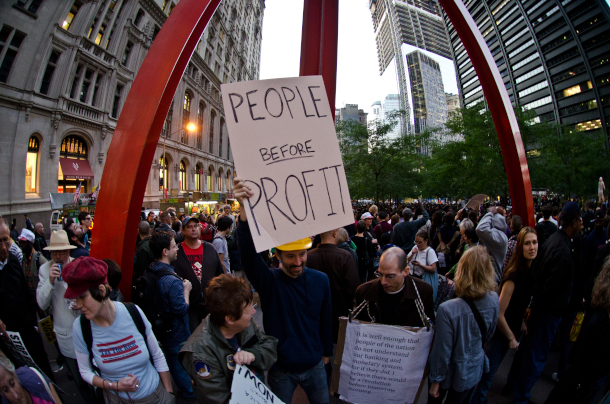Climate Activists Take Board Seats at Exxon
Air Date: Week of June 4, 2021

Exxon reported a $22 billion loss last year amid the economic slowdown from COVID-19. (Photo: Mike Mozart, Flickr, CC BY 2.0)
Climate activist investors recently claimed three seats on board of ExxonMobil, the largest energy company in the world. For more on how that might shift company priorities host Bobby Bascomb talks with Andrew Logan, a senior director at the non-profit Ceres.
Transcript
BASCOMB: A small hedge fund company, named Engine One, recently claimed three seats on the board of directors for Exxon Mobil. Engine One is a group of activist investors with a goal of moving the energy giant towards combatting the climate crisis. Many of the world’s energy companies have begun to scale back fossil fuel investments though Exxon has doubled down on such deals, forecasting increasing demand for oil and gas for years to come and putting vast oil reserves on its balance sheet. But Exxon reported a 22 billion dollar loss last year amid the economic slowdown from Covid-19. That loss and a lack of planning for the climate crisis has investors worried prompting several investment companies to support Engine One in their bid to move the board towards action on climate change. For more, I’m joined now by Andrew Logan, a senior director at the sustainability non-profit, Ceres. Andrew Logan welcome to Living on Earth.
LOGAN: Thanks for having me.
BASCOMB: So tell me first about Engine No. 1, the activist investment group that claimed these seats on the Exxon board. Who are they? And what are their goals here?
LOGAN: Sure. Well, Engine No. 1 didn't exist until about a year ago. So they are a new fund, though started by two people, Chris James and Charlie Penner, who have a long history as activists in more traditional corporate venues. But I think they saw an opportunity, both with climate change more generally, but with Exxon Mobil, specifically, to take those techniques, the sort of tactics they've honed over years to pressure companies that don't want to move, and an opportunity to apply those to Exxon, a company that is sort of famous for not wanting to move. So they are a small fund, I think they have around $250 million under management, which makes them about 1,000th, the size of Exxon Mobil, so definitely a David versus Goliath kind of battle. But ultimately, you know, I think as we saw, this was a fight where size was not the most important variable.
BASCOMB: Yeah, it is a real David and Goliath situation. But Engine No. 1 was supported in this effort by BlackRock investments, which is the largest asset management company in the world, and the second largest holder of Exxon stock. Why did BlackRock put their weight behind this move towards cleaner energy?
LOGAN: Yeah, I mean, I think what was powerful about the Engine No. 1 campaign is that it was not just about climate change. And it wasn't just about financial management, which are both areas where investors have had concerns with Exxon Mobil's performance, but it really was about the intersection of the two, really hitting at the idea that for any company, but certainly for an oil and gas company, you know, having a good strategy, in the low carbon transition is really critical to being successful, you know, financially, that you can't have one without the other. And while you know, Engine No. 1 kind of launched on their own, and they had no support at first, you know, they managed with that argument to build, you know, significant support amongst some of the largest investors in the world over the course of the campaign. So starting with some big pension funds, like the California Teachers Retirement System, or the New York State, common retirement system. And then as you say, you know, as we got closer to the annual meeting, picking up support from the likes of BlackRock and even Vanguard. So I think it just goes to show that the argument that they put forward, that climate change is a key financial risk and opportunity for oil and gas companies, was able to get a lot of traction.

Investor activism, where shareholders of a company join together to vote for board members or proxies aimed at a certain goal, has seen a surge in recent years. (Photo: Herr Hartmann, Flickr, CC BY-NC 2.0)
BASCOMB: It just makes financial sense, as well as, you know, ethical sense at this point.
LOGAN: Exactly. I mean, if they had gone out and launched or a moral crusade, you know, saying that Exxon was a bad company, and they were out destroying the Earth, that wouldn't have gotten them very far. But, you know, going out and arguing that, that Exxon was essentially destroying people's retirements because it wasn't taking climate change seriously, you know, that proved to be much more powerful line of argument.
BASCOMB: So the activists now have three seats out of the 12 member board, but they're still outnumbered. What kind of influence can they have moving forward?
LOGAN: Well, that would be the big test of this whole strategy, because as you say, they are outnumbered on this board. And I think a lot will depend on how the remaining members of the board, you know, choose to view last week's vote, you know, I think if they're rational people, which one assumes they are, they have to see the vote, which resulted in some of their colleagues literally being tossed out of their jobs, as a rebuke of the company's strategy on climate change, and really rebuke of the board as a whole. So, you know, it would be logical for this board to really want to rethink and reassess, you know, both the direction they're taking the company in, but also, you know, whether or not they are sufficiently independent from management, because that was certainly one of the the main criticisms that was lobbed at them in this fight was that they were essentially, you know, a tool of the CEO. So, you know, while there are only two or three seats held by these activists, ultimately, we think the rest of the board will want to change tact as well. Otherwise, you know, we may find ourselves a year from now back at the annual meeting in the same position of seeing directors tossed out of their jobs.
BASCOMB: And what about pressure from the federal government at this point? I mean, President Biden was recently touting how great that all electric F150 is. It seems, you know, the federal government is making a hard push away from traditional energy sources like oil and gas.
LOGAN: Yeah. And I think that was, you know, that was partly why this campaign was so successful. I think it really came at the right time. I think one of the things that Exxon has failed is to sort of keep track of the ways in which the world has changed around it. So not just on the policy front. And obviously, the new administration has brought in a very different approach to energy, but just the way that the rest of the economy is changing. And decarbonizing. And just over the past, you know, year or so, we've seen the six biggest banks in the U.S. committing to decarbonize their lending portfolios, which is obviously critical for a company like Exxon that depends on that lending for a lot of its capital. We've seen the power sector decarbonize or commit to decarbonizing. And we've seen the auto sector, you know, committing to an electrified future. And we've seen other companies in the oil and gas sector, like BP and Shell, you know, showing that it's possible for, for an oil and gas company to pivot to a different business model. So, you know, I think the world has changed around the company, and Exxon, you know seemingly didn't notice, or I guess, didn't care. And, you know, certainly what this vote ought to signal to the company and its board is that it's time to re engage with reality.

Investors incorporating sustainability into their strategies often look at companies considering the “triple bottom line”: people, planet, profit. (Photo: Kurt Christensen, Flickr CC BY-NC 2.0)
BASCOMB: Well, what kinds of changes are you expecting to see at ExxonMobil now, in light of this shake up on the board?
LOGAN: I mean, you know, we will look to see that the changes of Exxon, you know, largely in how it invests its capital. So this is a company that invests $20- $25 billion a year, you know, every year rain or shine. And, you know, historically, that flow of money has gone entirely into, you know, into filling up the world's energy mix with oil and gas. And so I think we'll be looking, as we head into the summer and fall and as a company sort of develops and releases its plans for the coming year or years, whether that investment flow starts to change. Will those tens of billions of dollars continue to go only into oil and gas, will we see the oil and gas business shrinking as it is, you know, say at BP? And will they diversify into other kinds of energy, you know, whether, you know, wind or solar or something maybe closer to their own kind of skills and capabilities, you know, like hydrogen or certain kinds of biofuels. But ultimately, you know, we'll have to follow the money and not the rhetoric and see if any change is actually happening on the ground.
BASCOMB: Exxon, of course, is the largest energy company in the world. How likely is it that we might see a similar shake up at one of their competitors like Shell or Chevron.
LOGAN: So I think that the victory that activists saw at Exxon Mobil is perhaps more important for the rest of the industry than it even is for Exxon. I mean, Exxon is one company, however big and important it may be. But you know, we know that the boards of other companies in this industry were following this campaign very closely. And I think the potential that they themselves might be tossed out of a job in the future for not doing enough to address climate change will certainly, you know, concentrate their mind in a way that I think will be extremely helpful, particularly as investors, you know, push them to set a more ambitious bar for addressing climate change. So I think certainly Chevron stands out. It's a company that is actually not that different from Exxon and that path is taken are really not taken in a decarbonizing world. So I think we'll see investor attention turn there. And certainly, you know, I think the Exxon victory, you know, ought to have softened up the ground quite a bit. So that's going to be much harder for, you know, for Chevron to refuse investor demands for more ambitious action. And in fact, you know, we saw Chevron had an annual meeting on the same day as Exxon Mobil's, and there was a proposal on the ballot for investors to vote on at Chevron that asked the company to set a greenhouse gas reduction target and one that included not just the emissions from its own operations, but emissions from the use of its product. So the burning of gasoline in cars, the burning of natural gas, and power plants. And that proposal, you know, won by actually a fairly large amount, it got, you know, over 60% of the vote, and you know, in a previous era, I think the Chevron board would have looked at that vote and thought, oh, that's interesting, you know, maybe we should put out a new report or talk to investors a bit more. You know, now, I think with, you know, activists having shown that they are willing to, you know, go at the boards of companies that aren't responsive, I think we'll see the Chevron board, really reckoning with the need to set a strong target where right now there isn't one for that company.

Andrew Logan is a senior director at Ceres. (Photo: Courtesy of Andrew Logan)
BASCOMB: And what does this mean for individual investors? You know, not somebody that's got millions invested, but somebody with an IRA or a 401k, that maybe has a little bit of money invested in these types of companies?
LOGAN: Yeah, well, I think what we have seen this year, not just at Exxon, but at you know, a lot of the oil and gas companies where proposals are going to a vote is that the individual investor actually has a powerful voice. You know, these votes, in the end were determined by these very large, you know, asset managers, you know, groups like Fidelity or Vanguard or State Street or BlackRock, you know, where many of us have our 401K's or our 403B's. And the, you know, these investors have been slow to act over time. And I think, partly it's because they had not historically thought that their clients cared very much. But I think what we've seen in the last year or two is that they are hearing from, from their clients, individuals, like the people listening to this show, and I think it's going to be important for them to continue to hear from individuals going forward, both that you know, we like what they've done this year, or at least we liked what they started and want to see them following through.
BASCOMB: Andrew Logan is a senior director at Ceres. Thank you so much for taking the time with me today, Andrew.
LOGAN: Thanks for having me.
Links
The New York Times | “Exxon Board to Get a Third Activist Pushing Cleaner Energy”
Reuters | “Engine No. 1 Extends Gains with A Third Seat on Exxon Board”
Living on Earth wants to hear from you!
Living on Earth
62 Calef Highway, Suite 212
Lee, NH 03861
Telephone: 617-287-4121
E-mail: comments@loe.org
Newsletter [Click here]
Donate to Living on Earth!
Living on Earth is an independent media program and relies entirely on contributions from listeners and institutions supporting public service. Please donate now to preserve an independent environmental voice.
NewsletterLiving on Earth offers a weekly delivery of the show's rundown to your mailbox. Sign up for our newsletter today!
 Sailors For The Sea: Be the change you want to sea.
Sailors For The Sea: Be the change you want to sea.
 The Grantham Foundation for the Protection of the Environment: Committed to protecting and improving the health of the global environment.
The Grantham Foundation for the Protection of the Environment: Committed to protecting and improving the health of the global environment.
 Contribute to Living on Earth and receive, as our gift to you, an archival print of one of Mark Seth Lender's extraordinary wildlife photographs. Follow the link to see Mark's current collection of photographs.
Contribute to Living on Earth and receive, as our gift to you, an archival print of one of Mark Seth Lender's extraordinary wildlife photographs. Follow the link to see Mark's current collection of photographs.
 Buy a signed copy of Mark Seth Lender's book Smeagull the Seagull & support Living on Earth
Buy a signed copy of Mark Seth Lender's book Smeagull the Seagull & support Living on Earth

